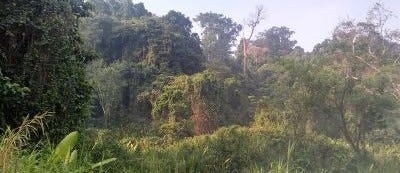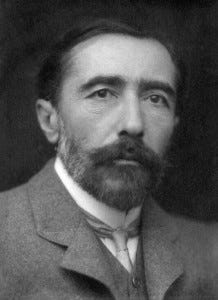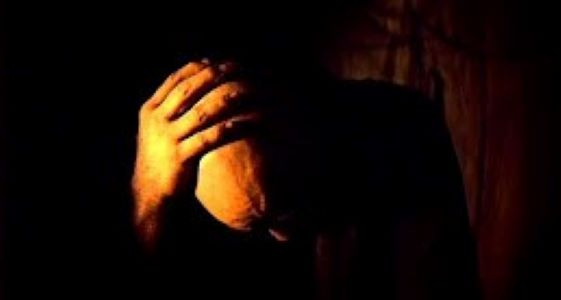“The great wall of vegetation, an exuberant and entangled mass of trunks, branches, leaves, boughs, festoons, motionless in the moonlight, was like a rioting invasion of soundless life, a rolling wave of plants, piled up, crested, ready to topple over the creek, to sweep every little man of us out of his little existence.” Joseph Conrad, Heart of Darkness
Say whatever else you will about Homo sapiens, we are not good at complexity. Our conceptions of life, particularly much of what's considered knowledge, are adept at generalization. Single components are often used in attempt to simply define complex systems which they are only a part. We grasp a part, one specific aspect of an intricately, immeasurably entangled system, such as an ecological system or even one particular in the internal workings of a single biological organism, then claim understanding. It cannot be denied in such division there is certain, even great power to then shape and form, move and build. Yet single pieces of knowledge never provide a whole understanding of whatever complex system they were derived.
Every technology simplifies complexity. Every technology is a literal hammer pounding a specific nail. Again, this in no way denies the power of any given technology, in many ways just the opposite, technology is a testimony to the abilities of the human intellect to form and wield the power of simple homogenized force. The revolutionary experience of the Industrial Era was the use of uniform force to reshape complex environments around any given single technology, resulting in a simpler, less complex order.
Joseph Conrad's sublime novel Heart of Darkness can be read as an allegory of humanity's struggle with complexity, most especially the seeming chaos of nature meeting industrial uniformity. Conrad beautifully describes nature's complexity as the jungle “rioting.” Rioting is an excellently astute term for humanity's general perception of complexity using both Webster's definitions of “a random or disorderly profusion” and “a violent public disorder.”
With this idea of rioting, Conrad expresses the deep human fear of nature, particularly since the dawn of the Agrarian Era when nature became separate, that is the world beyond human society, constantly threatening our imposed order. It is nature as undomesticated savagery, disorder we seek to order. Order in Heart of Darkness is civilization represented by the Company and its homogenization of all value based on one measure — the pursuit of profit from ivory. This is the novel's greatest and darkest destructive force.
Heart of Darkness is based on the brutal imperial rule of the Belgians over the Congo. In the long, horrendously bloody annals of European imperialism, the Belgian Congo was a particularly horrid affair. Marlow, the book's protagonist, hooks up with the Company headquartered in a Belgian city described as a “white sepulcher,” for a trip up the Congo river, not as an imperialist, but an adventurer. Meeting the Company's semi-mythical best employee, Kurtz, becomes his quest.
The Company’s hopeless, singular nihilistic drive representing European imperialism is first observed manifested in the trip down the African coast to the Congo's mouth. Marlow encounters various European outposts hanging onto the African coast in varying degrees of disarray, depravity, and decay. At times, the ship engages Europe’s greatest technology to worthlessly fire its guns into the jungle. Marlow remarks “in the empty immensity of earth, sky, and water, there she was, incomprehensible, firing into a continent.” He observes the whole affair has “a touch of insanity in the proceeding, a sense of lugubrious drollery in the sight.”
As he heads up the river, Marlow asks of the jungle, “Could we handle that dumb thing, or would it handle us? I felt how big, how confoundedly big, was that thing that couldn't talk, and perhaps was deaf as well. What was in there?" The incomprehensibility of the jungle's complexity holds no darkness, paradoxically it lies in the very understandably simple, single value of the Company. Marlow illuminates on the Company, “In the blinding sunshine of that land I would become acquainted with a flabby, pretending, weak-eyed devil of a rapacious and pitiless folly.” He adds, "To tear treasure out of the bowels of the land was their desire, with no more moral purpose at the back of it than there is in burglars breaking into a safe."
As for the people of the Congo, in the words of the Company's accountant, "When one has got to make correct entries, one comes to hate those savages ― hate them to the death." Measured with such a uniform, singular value, Kurtz's unmatched ability to collect ivory makes him a “prodigy,” in the European imperial sense “an emissary of pity and science and progress,” who Marlow discovers has not in the old colonial expression gone native, but savage. Kurtz's bloody obsession with being the most productive ivory collector becomes the rational for a brutal and savage rule — “The work was going on. The work!"
The power and limits of 19th century European technology within the vast complexity of nature is one of the book's tragedies, though Conrad is not simply talking about technology but the great nihilism of Western imperialism. The true immorality lie not up the Congo, but the Thames, to London, where lies “the heart of an immense darkness.”
"All Europe contributed to the making of Kurtz," the homogenizing force of European civilization is represented by technology and the singularity of value measured in profit with the collection of ivory. The inability to value beyond this singular, uniform measure, allows both the Company and Kurtz to descend into savagery. Maybe, this greatest sin is best expressed in “Apocalypse Now,” Francis Ford Coppola's surreal film adaption of Conrad's book. In the film, it is not the Belgians and Brits in the Congo, but Americans who rain down the brute, brutal, uniform force of modern technological savagery onto the jungles and peoples of South East Asia. Captain Willard (Marlow), now of the American army, Kurtz's commissioned executioner rationalizes, “Even the jungle wanted him dead.”
Marlow opines on Kurtz’s deviance, “Those heads on a stake would have been even more impressive if their faces had not been turned toward the house.” Kurtz's “unsound method” his “no method at all” is completely anathema to the jungle's complexity, where method, innumerable methods comprise every action.
Heart of Darkness is filled with the images and consequences of the force of Western uniformity, the powerfully destructive homogeneity of industrial technology in opposition to what Conrad describes as the “inscrutable intention” of nature's complexity. Yet in the last century, the opacity of nature's complexity has begun to be revealed.
In The Secret Network of Nature, Peter Wohlleben writes,
“When we see just how multilayered the interactions between different species are, we have to ask, once again, whether we will ever be able to fully comprehend the connections in our environment. The examples we've discussed so far involve just a few animals influencing each other in highly complex ways. Every time a new species enters the act, things become much more complicated and difficult to follow.”
A century later, Wohlleben's understanding of nature's complexity is certainly greater than Conrad's “invasion of soundless life.” Though still superficial, our growing knowledge of nature's complexity in many ways has revealed a completely contradictory understanding to many of our established and revered ideas of order. Our interactions with nature, especially in regards to technology, remain simplistic and require greater understandings of nature's complexity in our culture, politics, and economics.
Wohlleben writes,
“What is nature? One simple standard definition is that nature is the opposite of culture―that is to say, everything that people have not created or changed. This definition draws hard and fast boundaries around what can be called nature. Other definitions see people and their activities as part of nature. From this perspective, nature and culture cannot be clearly separated.”
This latter understanding of nature is a beginning. Humanity and every action we initiate are part of nature. We do nothing unnatural. Our technologies might be unprecedented, but never unnatural. If these technologies destroy long established systems, this is not unnatural, even though it leads to further extinction of species and the destruction of complex ancient ecological systems. Eventually, it may very well lead to the destruction of the human culture that created the technology, threatening the survival of the species Homo sapiens itself, but then we've only been around a few hundred thousand years on a planet that's been orbiting this radiant star for over 4.5 billion years.
Technologies developed from our less than a century knowledge of quantum physics and biology directly insert nature's complexity into the technologies and thus into human society as a whole, complexities that few, if any, truly understand. We quickly pile these new technologies atop two centuries old industrial infrastructures, infrastructures that transformed human life and reshaped numerous ecological systems in ways we still little understand or refuse to grasp. Today, nature's “inscrutable intention” internally reshapes human society.






